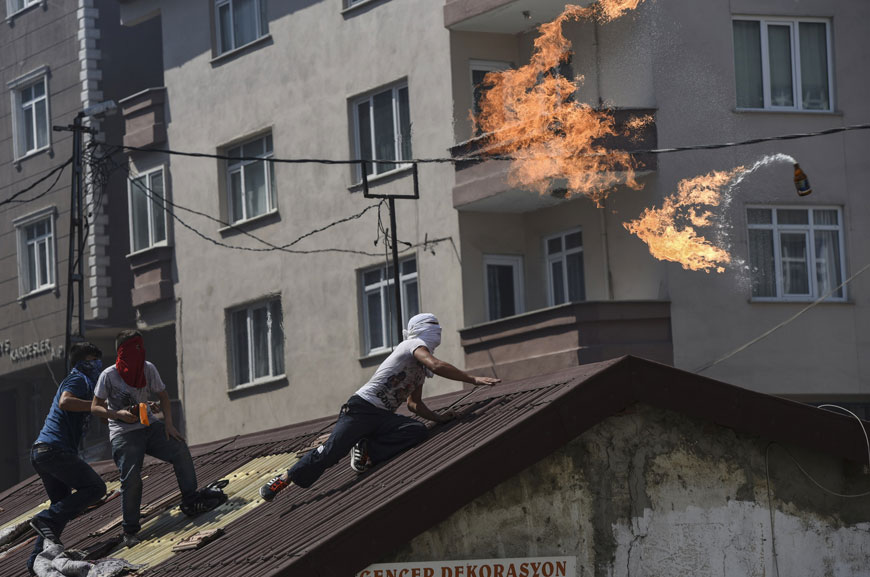ISTANBUL — The Turkish army on Sunday blamed PKK militants for a deadly car bomb attack that killed two of its soldiers in the Kurdish-dominated southeast, as a fragile truce risked collapsing after Ankara's air strikes on rebel positions in Iraq.
Turkey has launched a two-pronged "anti-terror" cross-border offensive against Daesh jihadists and Kurdistan Workers Party (PKK) militants after a wave of violence in the country, pounding their positions with air strikes and artillery.
But the expansion of the campaign to include not just Daesh targets in Syria but PKK rebels in neighbouring northern Iraq — themselves bitterly opposed to the jihadists — has put in jeopardy a truce with the Kurdish militants that has largely held since 2013.
The PKK on Saturday said that the conditions were no longer in place to observe the ceasefire, following the heaviest Turkish air strikes on its positions in northern Iraq since August 2011.
The car bomb went off as the soldiers were travelling on a road in the Lice district of Diyarbakir province late Saturday, the statement from the local governor's office said.
"Two of our personnel were killed in the heinous attack, four were wounded," it said.
The army blamed the "Separatist Terror Organisation" for the attack, using its customary phrase for the PKK which it never refers to by name.
It said the victims had been lured to the site of the attack after the PKK set three vehicles on fire on the road linking the cities of Diyarbakir and Bingol.
The PKK's military wing, the People's Defence Forces (HPG), claimed the attack in a statement on its website but gave much higher toll of eight soldiers killed.
'Ceasefire over'
The PKK has for decades waged a deadly insurgency in the southeast of Turkey for self-rule, a conflict that has claimed tens of thousands of lives. A peace process that began in 2013 has so far failed to yield a final deal.
"The ceasefire appears to be over," Middle East specialist David Romano of Missouri State University said in emailed comments, arguing that the main focus of the Turkish military campaign was the PKK rather than Daesh.
Turkish armed forces had Saturday pressed on with a new wave of strikes against Daesh and PKK targets, but there were no reports of new air raids overnight.
The HPG said three more PKK fighters had been killed in the latest Turkish air strikes Saturday, after one was killed in the first wave.
The president of the Kurdish-ruled autonomous region in northern Iraq, Massud Barzani, expressed "displeasure with the dangerous level the situation has reached," his office said.
With Washington gladdened by Turkey's readiness to step up its role in the coalition against Daesh, the White House backed Turkey's right to bomb the PKK.
"Turkey has a right to take action related to terrorist targets," said deputy national security advisor Ben Rhodes, noting that the United States lists the PKK as a terrorist group.
Prime Minister Ahmet Davutoglu ordered the campaign after a week of violence in Turkey that began on Monday with a suicide bombing blamed on IS in a town close to the Syrian border that killed 32.
This incensed Turkey's Kurds, who have long accused the government of actively colluding with Daesh, allegations Ankara categorically denies.
Two Turkish policemen were shot dead Wednesday while sleeping in their homes in the southeast, in murders claimed by the PKK.
With Turkey still without a permanent government after a June 7 election resulted in the ruling Justice and Development Party (AKP) losing its overall majority for the first time since 2002, parliament has been summoned to meet on Wednesday to discuss the security situation.
Protests shake Turkey
Tensions across the country are high, with police routinely using water cannon to disperse nightly protests in Istanbul and other cities denouncing Daesh and the government's policies on Syria.
Turkish police and protesters on Sunday engaged in new clashes in the flashpoint Istanbul district of Gazi, where a leftist activist was killed during police raids earlier this week.
Protesters hurled stones and Molotov cocktails at the police who responded with water cannon, an AFP correspondent said.
The Istanbul authorities banned a planned anti-jihadist "peace march" scheduled to take place in the centre of the city on Sunday, citing security and traffic congestion.
Meanwhile, a 21-year-old man died in the town of Cizre in the southeastern Sirnak province in clashes between police and pro-Kurdish demonstrators, reports said.
Turkish security forces have since Friday rounded up at least 590 suspected members of Daesh, the PKK and other militant groups across the country on the grounds that they pose a threat to the state.
